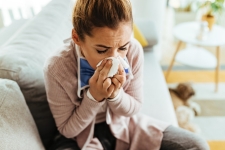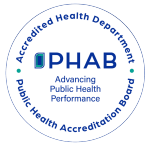Seasonal Influenza (Flu)
The County of San Diego is committed to ensuring residents continue to have access to safe and effective vaccines that are based on credible, transparent, and science-based evidence. In alignment with the West Coast Health Alliance and other leading medical, health, and patient advocacy groups, we follow the American Academy of Pediatrics (AAP) Recommended Child and Adolescent Immunization Schedule.

Influenza (flu) is a contagious respiratory illness caused by influenza viruses.
- It spreads easily from person to person.
- It infects the nose, throat, and sometimes the lungs.
- It can cause mild to severe illness. In some cases, it can lead to death.
On this page:
Everyone 6 months and older should get a flu vaccine every season (unless told otherwise by a medical provider).
The flu vaccine is especially important if you are at high risk for getting very sick from the flu. This includes:
- Adults 65 years and older.
- Children under 2 years old.
- People with health problems like:
- Asthma or other chronic lung diseases
- Neurologic (brain) and neurodevelopment conditions
- Blood disorders
- Diabetes or other endocrine disorders
- Heart, kidney, liver, or metabolic disorders
- People with a body mass index (BMI) of 40 or higher (severe obesity).
- Kids and teens (under 19 years old) who take aspirin or salicylate-containing medications long-term.
- People with weakened immune systems (from illness or medicines).
- People who have had a stroke.
- People with certain disabilities.
Other people at higher risk from flu include:
- Pregnant people.
- People living in nursing homes or other long-term care facilities.
- People from some racial
and ethnic groups, including:
- Black (non-Hispanic)
- Hispanic or LatinoAmerican Indian or Alaska Native
There are also everyday preventive actions that you can take, like covering coughs and sneezes, washing your hands, taking steps for cleaner air, and stay home and away from others if you are sick.
Flu spreads mostly through droplets in the air, when people with flu cough, sneeze, or talk. These droplets can land in the mouths or noses of people who are nearby.
Less often, a person might get flu by touching a surface or object that has flu virus on it and then touching their own mouth, nose, or eyes.
Flu symptoms usually come on suddenly and may include:
- Fever* or chills
- Cough
- Sore throat
- Runny or stuffy nose
- Body or muscle aches
- Headache
- Feeling very tired
- Vomiting or diarrhea (more common in children)
*It’s important to note that not everyone with flu will have a fever.
Most people who get the flu will start to feel better in a few days to less than two weeks. Some people may develop complications because of the flu. Sinus and ear infections are examples of moderate complications from flu. Pneumonia is a serious flu complication.
Doctors can test for the flu, but they may also diagnose it based on your symptoms.
Most people with flu have mild illness and do not need medical care or take special medications. If you get sick with flu symptoms, in most cases, you should stay home and avoid contact with other people unless you need medical care.
There are prescription medicines called antiviral drugs that can help treat flu illness.
County of San Diego
- Educational Materials and Resources
- Respiratory Viruses
- Getting Your Vaccines
- Information for Health Care Professionals
California Department of Public Health (CDPH)
Centers for Disease Control and Prevention (CDC)
Call the Immunization Unit at (866) 358-2966, or send an email, for more information.






